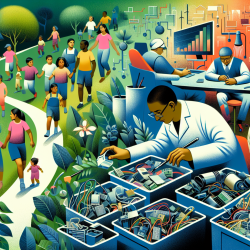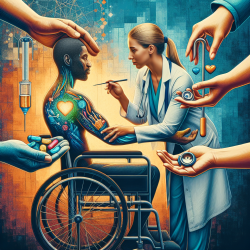Empowering Change: The Path to Healthier E-Waste Recycling Practices
In the dynamic landscape of environmental health, the study titled Health Assessment of Electronic Waste Workers in Chile: Participant Characterization offers a profound insight into the occupational health of e-waste recycling workers in Chile. As a practitioner, understanding the implications of this research can empower you to advocate for improved safety standards and healthier work environments, particularly for vulnerable populations such as children.
Understanding the Context
Electronic waste, or e-waste, is a rapidly growing environmental health issue. The research conducted in Chile highlights the occupational health status of e-waste workers, comparing those in informal settings with those in formal recycling facilities. The study reveals that while workers generally reported good health, there were significant occupational stressors and a high prevalence of injuries, particularly among informal workers.
Key Findings and Implications
- Workers frequently reported exposure to noise and insufficient income, contributing to stress and health issues.
- Occupational injuries were common, with low usage of safety equipment.
- Few significant health differences were found between informal and formal workers, but formal workers reported better access to safety measures.
These findings suggest a need for improved occupational health policies and practices, particularly in informal recycling settings. Practitioners can play a crucial role in advocating for better safety standards and health assessments, ensuring that workers have access to necessary protective equipment and medical care.
Taking Action: Data-Driven Decisions
As a practitioner, leveraging data-driven decisions can help you implement effective strategies to improve occupational health outcomes. Consider the following steps:
- Advocate for Policy Change: Use the data to push for stronger regulations and enforcement of safety standards in both formal and informal e-waste recycling sectors.
- Promote Education and Training: Develop programs to educate workers about the risks associated with e-waste recycling and the importance of using protective equipment.
- Collaborate with Stakeholders: Engage with local governments, NGOs, and community leaders to create comprehensive health assessments and interventions.
Looking Ahead: The Role of Research
This study serves as a baseline for future research and policy development. By continuing to explore the health impacts of e-waste recycling, we can better understand how to protect workers and the environment. Practitioners are encouraged to delve deeper into this area, contributing to a body of knowledge that can drive meaningful change.
To read the original research paper, please follow this link: Health Assessment of Electronic Waste Workers in Chile: Participant Characterization.










